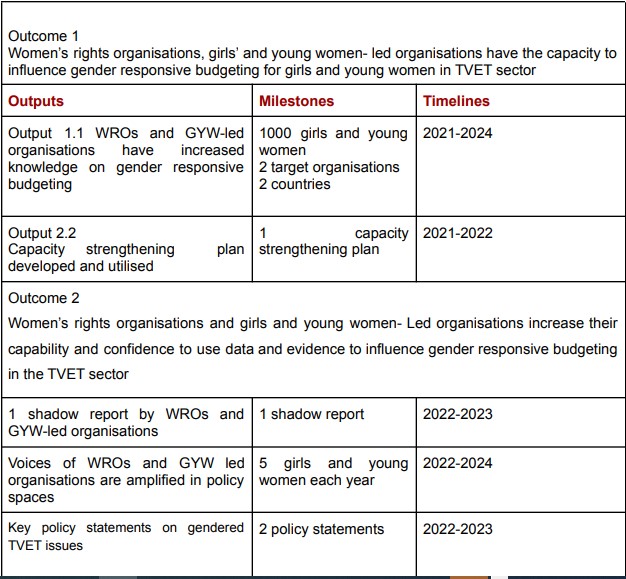Consultant Job- Baseline Survey for Influencing Inclusive Access to Girls Education in East Africa, FEMNET
Expression of Interest: FNT/EOI/02/2022
1. Background
The African Women’s Development and Communication Network (FEMNET) is a pan- African, feminist and membership-based network based in Nairobi with over 800 members across 48 African countries. FEMNET envisions an African society where gender equality is achieved, and women and girls enjoy all their rights and live-in dignity. FEMNET exists to facilitate and coordinate the sharing of experiences, ideas, information, and strategies for human rights promotion among African women’s organizations through networking, communication, capacity-building, and advocacy at the regional and international levels. FEMNET was conceived in 1988 but formally registered in 1993 under ’s applicable incorporation laws and/or regulations.
Since inception in 1988, FEMNET has strategically positioned herself as a convenor, organizer and facilitator of dialogues around critical issues including women’s involvement in governance and leadership, promoting women’s economic justice, advocating for women’s sexual and reproductive health and rights, ending gender-based violence and harmful practices (such as female genital mutilation and child marriage) and strengthening the women’s movement in Africa.
FEMNET continues to be intentional in influencing decisions made at national, regional, and global levels, constantly ensuring African women voices are amplified and their needs, priorities and aspirations are prioritized in key policy dialogues and outcomes that have direct and indirect impact on their lives. FEMNET has established her niche as a nucleus serving to mobilize African women and girls to lobby and advocate for the domestication and implementation of commitments made by African governments to the advancement of gender equality and realization of women’s rights.
2. About the project:
Influencing Inclusive Access to Girls Education in East Africa is a project funded by ECHIDNA GIVING Foundation, the project will focus on raising the voices of young women and girls in ensuring inclusivity in the TVET sector.
FEMNET is seeking to partner with CSOs particularly women’s rights organization and girls’ and young women-led organizations and networks to influence and advocate for inclusive access to girls’ education in Technical and Vocational Education Training (TVET) using a feminist approach.
FEMNET seeks to implement this intervention at the regional African Union level, Regional Economic Commission level, East Africa Community and at national level in Kenya and Uganda. Building on the existing experience, FEMNET will ensure;
- Women’s rights organizations, girls’ and young women-led organizations advocacy capacities are strengthened to influence gender-responsive education and TVET policies and commitments.
- Women’s rights organizations and girls and young Women-Led organizations increase their capability and confidence to use data and evidence to influence gender responsive budgeting in the education sector including TVET
FEMNET will use a gender lens in the proposed project to;
Support programs and advocacy efforts that help young women and girls get the skills training and education they need to succeed. Giving young women and girls more opportunities to complete training and education makes it easier for them to find decent work and reach their full potential. To support these efforts, FEMNET will also actively promote awareness of the benefits of education for young women and girls at every opportunity and of the need for curricula free of gender stereotypes, including at international forums, bilateral talks and informal meetings.
Work to ensure that school facilities are welcoming spaces that respond to the specific needs of girls. FEMNET will ensure that investments in education include provisions for separate and appropriate washroom facilities, as well as systems to help manage menstrual hygiene, and that support is given to programs that help prevent and respond to school-related gender-based violence.
Support programs and partners that help those who have missed out on the opportunity to complete a quality education. Not all young people are able to finish school, which puts them at a disadvantage, not only are they missing critical knowledge and skills needed to face life’s challenges, but they are also likely to find it more difficult to find and keep decent work. To improve opportunities for these young people, FEMNET will support programs and partners that provide life skills, and technical and vocational education and training, with an emphasis on assisting women and marginalized youth find work, including in non-traditional and better-paying fields.
The project will focus on girls between the age of 14 and 24 years. The project will specifically reach out to the following groups:
- GYW living in poor, remote rural areas, and urban slums
- GYW experiencing gender-based violence (particularly girls who have married as minors)
- GYW with disabilities
- GYW who are out of school (including teenage mothers)
- Refugee and internally displaced GYW
- GYW from sexual minority groups
The project is expected to achieve the following:

3. Overall Aim / Purpose
The baseline will measure the status of all indicators and seek to understand the starting point of key elements of the work against which later progress will be measured. This will enable project indicators at output and goal/outcome level to be measured and tracked.
The objective of the baseline survey is to assess the existing TVET policies, the level of participation of Girls and Young women on pushing for policy implementations and policy formulations that respond to making TVET sectors more inclusive and appealing to girls and young women. The baseline should also be able to identify gaps in the policies and recommend a way forward. The baseline report will be used for monitoring the benchmark of existing practices and evaluating the project implementation.
Several objectives are determined to see the results into areas mentioned below;
- Provide a synopsis of existing policies/strategies that the two governments might have put in place to fight inequality; if they exit, then in what state.
- Analyze existing gaps in Uganda and Kenya TVET education sector.
- Assess the level of involvement of young women and girls in the formulations and discussions of TVET policies, involvement in budget making processes and prioritization of allocations of resources to gender responsive services in the education sector.
- Analyze the performance of Uganda and Kenya states in the adoption of inclusive service delivery.
- Asses the current budget allocation for the education sector in Kenya and Uganda.
- Assess the capacity, knowledge and skills of CSOs and WROs to gather evidence and influence the formulation and implementation of education Policies
- Assess the involvement of policy stakeholders in dialogues on matters education with the intention of proactively enhancing the sector.
- Map out existing platforms/pathways that CSOs/WROs can tap on to influence policy makers on matters of education.
- Assess the existing COVID 19 recovery plans to ensure that Girls and young women adversely affected by the pandemic get to go back to school or access other education services.
- Identify areas of potential learning and come up with a framework to ensure cross learning between the partners.
- Scan the regional economic blocks and AU and highlight opportunities that girls and young women can tap into to advocate for better education for girls and young women.
4. Terms of References
FEMNET will select a lead consultant/institution through a competitive process to conduct the baseline survey. The selected research consultant will be required to prepare a detailed research methodology in partnership with FEMNET. The baseline survey will be proposed to apply both quantitative and qualitative data collection methods.
In Liaison with the programme team at FEMNET,
- The consultant will Conduct in depth interviews, develop and administer a questionnaire tool to FEMNET, TVET actors, government departments, CSOs, WROs and GYW organizations.
- Conduct desk top research on existing policies on TVET and service delivery especially in the education sector in Uganda and Kenya.
- Conduct key informant interviews with policy makers/duty bearers, CSOs and other key stakeholders as may be required in the course of the study.
- Compile a draft report and share with the programme team
- Compile and present the final report to FEMNET
Expected Output
The expected output from the consultancy will be; –
- An Inception Report detailing the methodology and limitations and tools prior to commencement of the study
- A draft baseline report
- An analysis of the data resulting in a presentation of baseline values for all project indicators at all results levels (Impact, outcome and Output Levels)
- Monitoring methods and tools for measuring impact and sustainability of project activities
- Conclusions and recommendations to enhance the project overall success
- A well designed final baseline report highlighting the key issues regarding context analysis, the planned outcomes and outputs.
- A Power point presentation of preliminary findings to the project team and funding partner
5. Request for Expression of Interest
The African Women’s Development and Communication Network (FEMNET) invites eligible and qualified Individuals to indicate their interest in providing the services. Interested consultants must provide information indicating that they are qualified to perform the services giving a description of similar assignments undertaken.
6. Required Qualification, Skills and Competencies
The Consultant is expected to have the following minimum qualification and experience:
Education
- Hold a Masters’ Degree in, Development Studies, Monitoring and Evaluation, Gender and Development, or any other related field from a recognized university.
Expertise:
- Demonstrable expertise on research, with a minimum of 5 years record in conducting baselines using qualitative and quantitative approaches with a clear-cut gender lens
- Have experience in working with Women rights and feminist organization/networks
- Experience in data collection and analysis using participatory methodologies, feminist lens in research.
- Experience carrying out research on policy and advocacy project particularly with a focus on education.
- Proven track record of delivering concise and clear reports under time pressure
- Excellent communication and written skills in English
7. Selection of Consultant
A consultant will be selected in accordance with FEMNET’s policy on the selection of Individual consultants’
8. Duration of Assignment
The duration of the assignment is estimated to run from February 2022 to March 2022
9. Application Process
Interested parties should submit their technical and financial proposals by email to recruitment@femnet.or.ke by 5.00pm EAT on 4th February 2022. Please indicate the reference on the subject line as FNT/EOI/02/2022 Baseline Survey IAGEEA.
a) Technical Proposal should be no more than 5-pages and include:
- Cover letter with working contact details to express interest and confirmation of availability to undertake assignment in period stated.
- Understanding of the Terms of Reference
- Approach and Methodology that demonstrates how the consultant will undertake the assignment
- Work plan indicating number of days for each task, and clear deliverables (use Gantt Chart) and allocation of consultant(s) tasks during the assignment
- Summary profile demonstrating background of consultant(s), name and attach CVs separately
- Annex Sample reports of previous baseline assignments that the consultant has undertaken
- Contact information
b) Financial Proposal should include:
- Professional fees
- Travel, Accommodation and related disbursement costs
- Value Added Tax rates, as applicable
- Withholding Tax rates, as applicable
To apply: https://femnet.org/job/baseline-survey/







